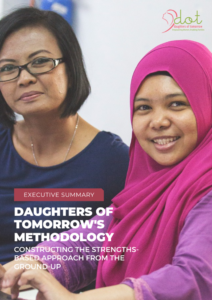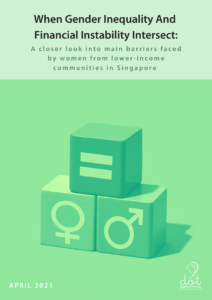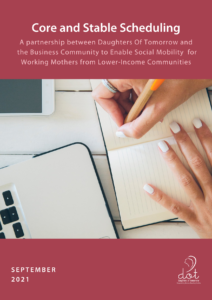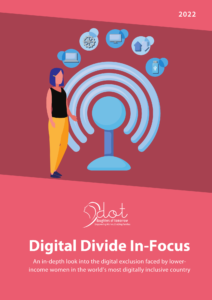Research
Our Research Ethos
As one of the few organisations in Singapore that focus specifically on assisting women from lower-income communities in obtaining sustainable income opportunities, DOT’s work on the ground during the last seven years has allowed us to build an arsenal of knowledge on the issues faced by the demographic we serve. By supplementing this experience with facts and figures, our research projects aim to help raise awareness on poverty in Singapore. On the other hand, we believe that our beneficiaries are experts on the barriers they face. As such, we at DOT believe that our work, as well as the social service industry in Singapore, can always benefit from the guidance we receive from our beneficiaries in the form of research findings.
In other words, our research efforts at DOT follow two objectives.
We do research to better explore the issues faced by our beneficiaries so we can increase our impact in their lives.
We produce facts and figures related to the issues faced by our beneficiaries to help tackle misunderstandings about living in poverty and advocate for a silent minority of our population
Want to Collaborate with us?
Agencies and individuals looking to conduct research with DOT beneficiaries must please note that we currently only partake in partnerships that serve the abovementioned objectives.
Additionally,
- All proposed research content and language must regard and address beneficiaries respectfully; facilitators should approach our beneficiaries as experts of their own lives and the issues faced by women from lower-income communities in Singapore,
- Beneficiaries must be adequately compensated for their time spent taking surveys, being interviewed, or partaking in focus group discussions,
- DOT must be acknowledged as a research partner/referral partner in the final product,
- Findings or the final product must be shared with DOT,
- Students looking to conduct research with our demographic cannot have direct contact with our beneficiaries.
DOT may consider research requests that do not fit our objectives on a case-by-case basis; for these partnerships a consultancy fee will apply.
For all research collaboration requests, we may be reached at Research@DaughtersOfTomorrow.org
Our Reports
Researcher FAQs
Below are some questions we are frequently asked by researchers interested in our work and our beneficiaries. If you are a researcher in need of more information, please take a look at the research reports above. For potential collaborations, please see our research guidelines.
- DOT primarily serves women whose income puts them in the bottom 10th percentile of income in Singapore.
- 86% of our beneficiaries are Singapore Citizens, while the rest are migrant wives or mothers.
- 77% are racial minorities.
- The average DOT beneficiary is around 35 years old.
- Most hold at least an N Levels certificate.
- Around 50% of our beneficiaries are married, and about 10% are unwed mothers.
- 87.5% are mothers, and 68% have between 1 and 3 children.
We use our “Employ to Empower” process to set women on their journey out of abject poverty. The process starts with DOT receiving direct referrals from social workers and social service officers. Beneficiaries interested in our work then attend DOT’s Job Readiness Programs to prepare them for a stable and sustainable employment journey. At the core of this effort is DOT’s Confidence Curriculum (DCC), an 8-week travelling program that focuses on equipping the participants with essential skills, such as resume-writing, interviewing, and business-appropriate grooming, as well as guiding the participants into setting realistic goals and maintaining a positive outlook. Additional regular and ad-hoc skills-training programs further help our beneficiaries in their journey to employment. All programs offered by DOT include free childminding conducted by our volunteers, so that we can ensure that mothers can attend courses with their young children. Similarly, the Community Childminding Network, which was spearheaded by DOT in its creation, helps mothers in need of childcare by matching them with low-fee childminders so that our beneficiaries can attend programs and work.
Alongside the Job Readiness Program, DOT assigns a Befriender volunteer to each beneficiary. The Befriender, who acts as a peer-coach supports the beneficiary emotionally throughout their journey with DOT and remains in contact with them even after post-employment to ensure that the beneficiary is stable and content in their income opportunity.
When a beneficiary is ready for employment, we match them with an income opportunity from our employer partners, based on the beneficiary’s skills, needs, and interests. On the employer front, DOT engages employers who are empathetic to barriers faced by our beneficiaries. By connecting with partners that are already determined to help women from lower-income opportunities, we aim to ensure a better fit for our beneficiaries as they enter the working world. Our Living On The Edge poverty sensitization workshop further helps our employer partners gain awareness on the struggles many of our beneficiaries face, which in turn helps them adopt more flexible, mother-friendly and inclusive working practices.
- Almost half of our beneficiaries cite childcare issues as the primary barrier to finding employment. As the sole caregivers to children and other relatives in need of care, most women we hope to serve struggle finding childcare options outside of childcare centre operating hours (7am to 7pm). This issue becomes even more problematic for mothers who are stuck in waitlists and can’t enrol their children to any formal centres.
- About one third of DOT beneficiaries cite being forced to take a long hiatus from work as a barrier to employment. Particularly, any hiatus taken for care of children cause mothers to be dismissed from future employment opportunities, as many hiring managers still deem unpaid female labour of care to be a simple gap in employment history.
- Around one fourth of our beneficiaries cite legal issues, mainly divorce and its consequences as their barrier to employment. Indeed, many women we serve not only face dire financial consequences when going through divorce, but also face potential homelessness as they are forced to leave their matrimonial homes
DOT aims to place women in jobs that meet their reasonable salary expectations and allow them the flexibility to attend to their caregiving responsibilities. While we offer jobs from various industries, positions in admin, F&B, hospitality, retail, childcare, eldercare, and beauty sectors are the most matched under DOT’s services. Although home-based and remote work has become more prevalent because of Covid-19, we are unable to offer a large number of such positions that would help our beneficiaries earn enough money to leave abject poverty behind.
CSS is a zero-cost model that provides fixed-shift work to mothers with family responsibilities during office hours. It allows them to access services from childcare centres and avoid late pick-up fees.
Traditionally, in industries that rely on rotating-shift models, such as F&B and retail, workers are put on different schedules every week, sometimes every day. CSS helps mitigate mothers’ problem of having to find childcare solutions every time their shifts change. By encouraging our employer partners to give mother-friendly shifts to our beneficiaries with young children, this initiative not only helps mothers stay in stable employment, but also helps businesses reduce attrition caused by their workers’ care responsibilities.
If you’d like to collaborate with us on research, feel free to connect with us at Research@DaughtersOfTomorrow.org.





